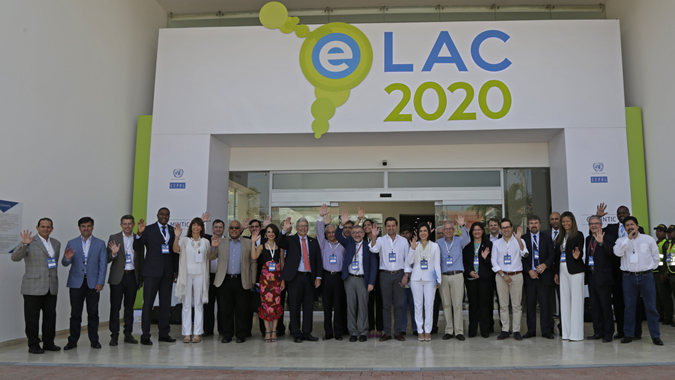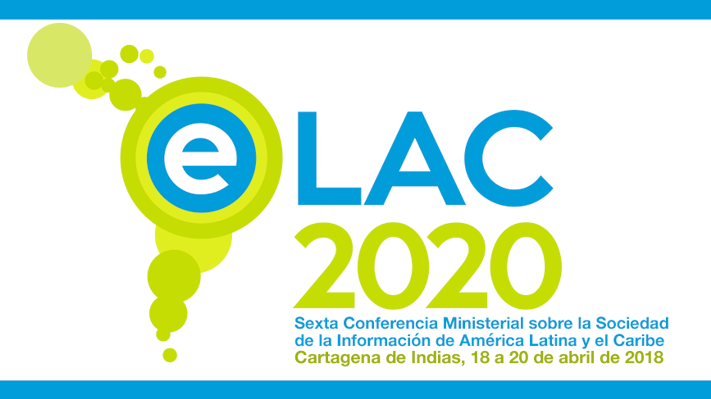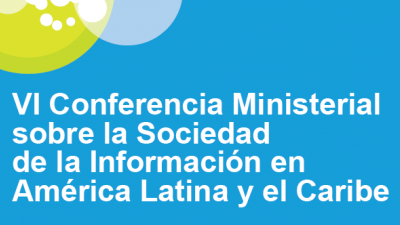Twenty Three Latin American and Caribbean Countries Meet in Colombia to Define the Region’s New Digital Agenda and Move Toward a More Sustainable Economic, Social and Environmental Model
Work area(s)
Sixth Ministerial Conference on the Information Society was inaugurated today in the city of Cartagena.

With the presence of senior authorities, delegates from 23 countries in the region, international experts, scholars on Information and Communications Technologies (ICTs) and representatives of the private sector and of civil society, the Sixth Ministerial Conference on the Information Society in Latin America and the Caribbean began today in Cartagena, Colombia, with the aim of defining a Digital Agenda for Latin America and the Caribbean (eLAC 2020) to strengthen public policies that promote the digital ecosystem and fuel knowledge, inclusion, equity and innovation.
The high-level meeting, which will take place through Friday, April 20, is organized by the Economic Commission for Latin America and the Caribbean (ECLAC) and the government of Colombia, the country that will assume the presidency of the 15-year-old mechanism. At the gathering, an assessment will be carried out and the agreements established in Mexico in 2015 will be renewed.
To this end, the United Nations’ 2030 Agenda for Sustainable Development and its 17 Goals (SDGs) will be given special consideration, since they highlight the moment of opportunity that we are experiencing and the possibilities that information and communications technologies and global interconnection provide to accelerate human progress, closing the digital gap and developing knowledge societies.
The opening ceremony of the Sixth Conference on the Information Society was led by David Luna, Minister of Information and Communications Technologies of Colombia; Yolanda Martínez, Coordinator of the National Digital Strategy of Mexico; and Mario Cimoli, ECLAC’s acting Deputy Executive Secretary.
In his welcoming remarks, Mario Cimoli indicated that the development of Latin America and the Caribbean cannot be understood without the fundamental issue of the digital agenda, which will help achieve better salaries, better social inclusion and greater gender equality.
He stressed that this eLAC meeting, which brought together 23 delegations from Latin American and Caribbean countries, demonstrates regional integration and the commitment of countries to position the digital agenda in their public policies.
Meanwhile, Yolanda Martínez indicated that technology will help close development gaps, which is why eLAC is very important because this transformation must be carried out through a State policy that promotes digital transformation with equity and must be capable of achieving the 2030 Agenda’s goals.
The Mexican official underscored that Information Technologies must always have people at the center, and that is why the focus has changed from promoting infrastructure and digital coverage to seeking quality, relevant content and cybersecurity.
Minister David Luna, for his part, conveyed the greetings of the host government and emphasized that in Colombia “we set out to build the bases for the digital economy to evolve and put technology at the service of education, employment, the transformation of governments and the development of regions.”
The Colombian minister said that the agenda that ECLAC is forging contained in the document Data, algorithms and policies: Redefining the digital world is very valuable because in an umbrella study, it presents the impact on culture, government, inclusion, technologies, the market and digital governance.
“We will only resolve our structural problems if we do it through emerging technologies,” Luna said.
The conference will include seven keynote speeches by: Minister David Luna; Alejandro Olaya Dávila, General Director of the Administrative Department of Science, Technology and Innovation of Colombia (COLCIENCIAS); Dave Mata, Managing Director of Block Bits Capital, Chief Product Officer of Prizm Labs; Greg Wyler, Founder of OneWeb; Raúl Katz, President of Telecom Advisory Services LLC; Mischa Dohler, Professor in Wireless Communications at King’s College London (UK); and Robert Pepper, Head of Global Connectivity and Technology Policy at Facebook.
Meanwhile, on behalf of ECLAC’s Executive Secretary, Alicia Bárcena, Mario Cimoli presented the document Data, algorithms and policies: Redefining the digital world, which ECLAC specially prepared for this conference. It describes the technological trajectories that have characterized the “digital revolution” of recent years: the Internet of Things, blockchains and artificial intelligence – technologies that affect the economy and society, both in a cross-cutting and sectoral fashion.
The study also analyzes two enablers of their use: global digital platforms and the training of human resources qualified to operate advanced digital technologies. It examines the impact of these and other digital technologies on two vertical dimensions: manufacturing and advanced services, and on digital financial technology (fintech) firms. Finally, the document concludes with an analysis of the implications of artificial intelligence for achieving the SDGs.
The study underscores that it is necessary to strengthen policies at a regional level to promote innovation, diffusion and appropriation of the new technologies and thereby move toward a new economic, social and environmental model in line with the 2030 Agenda for Sustainable Development.
Related event
Related content

Con delegaciones de 26 países, comenzará en Cartagena la VI Conferencia Ministerial sobre la Sociedad de la Información de América Latina y el Caribe - eLAC 2020
Colombia recibirá la Presidencia de este mecanismo, que busca definir la agenda digital para América Latina y el Caribe, y el plan de acción para que las TIC se conviertan en la base del desarrollo…
Subregional headquarter(s) and office(s)
Related link(s)
Country(ies)
- Latin America and the Caribbean
-
Colombia
Related project(s)
Contact
Public Information Unit
- prensa@cepal.org
- (56 2) 2210 2040


